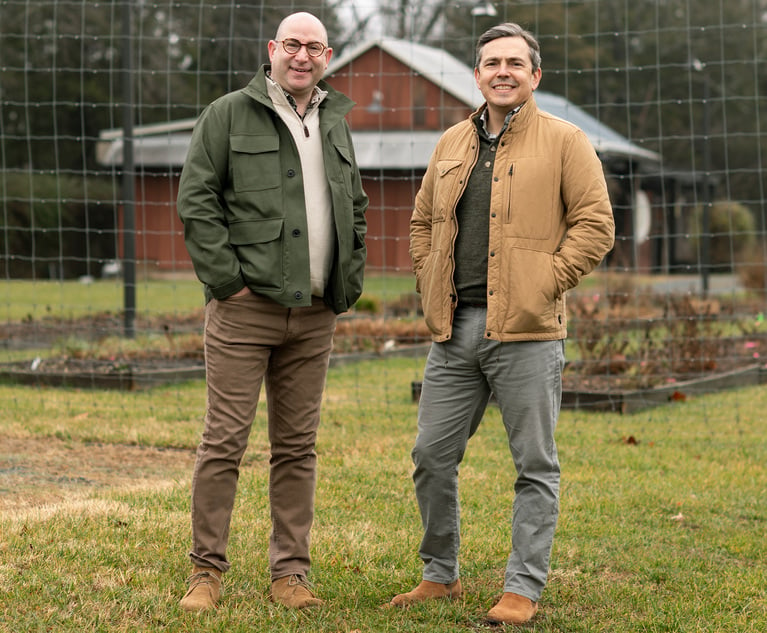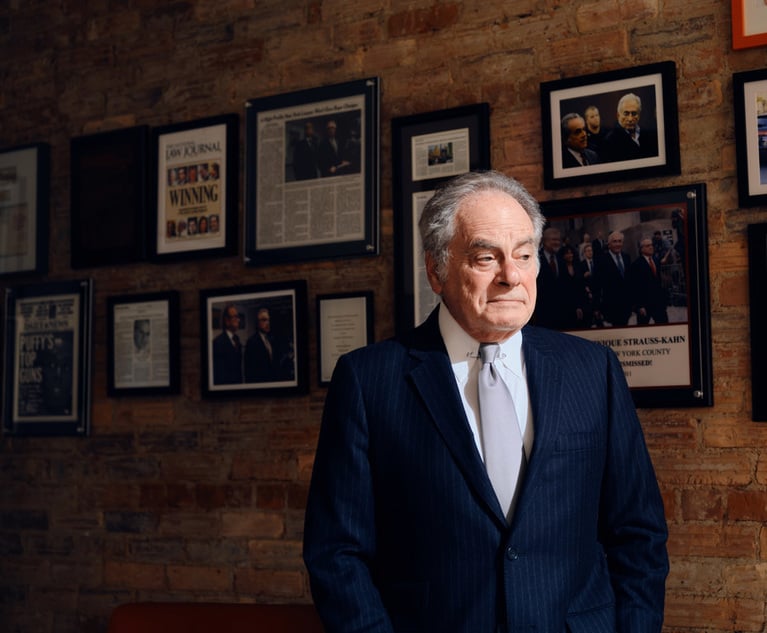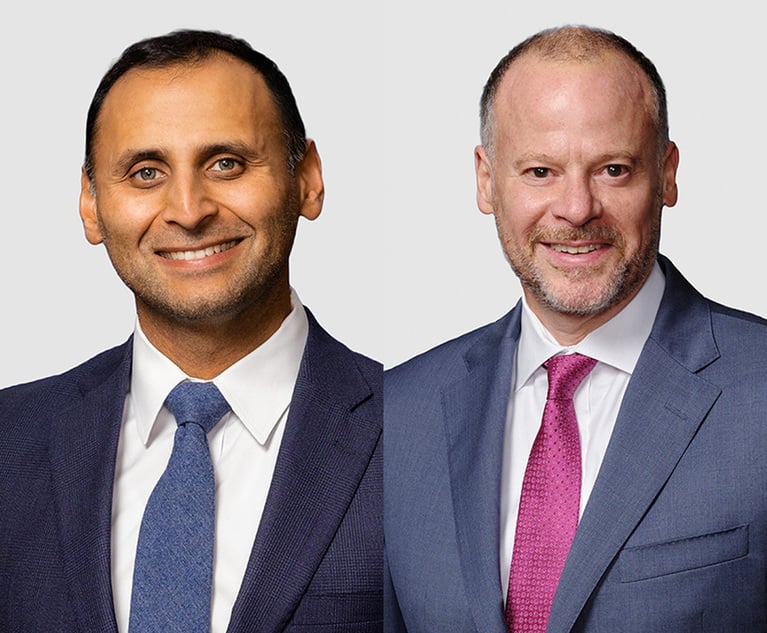Litigator of the Week: Rosenkranz Revives Oracle Copyright Case Once Again
Orrick, Herrington & Sutcliffe partner E. Joshua Rosenkranz breathed new life into a case that may be worth many billions to client Oracle Corp.
March 30, 2018 at 12:08 PM
4 minute read

Appellate courts don't like overturning jury verdicts. Until this week, none is known to have overturned a jury verdict of fair use in a copyright infringement case.
But Orrick, Herrington & Sutcliffe partner E. Joshua Rosenkranz had two things going for him when he asked the U.S. Court of Appeals for the Federal Circuit to throw out Google's fair use jury verdict in its mega-high-stakes dispute with Oracle Corp.
The first was a previous trip to the Federal Circuit, in which the court critiqued Google's fair use case and laid out a roadmap for deciding it. The second was a powerful story from “the mouth of the plagiarist itself,” Rosenkranz says, referring to emails among Google executives discussing their plans to copy portions of the Java application program interface.
“They knew, in the words of their executives, that all of the alternatives suck,” Rosenkranz says. “How often do you get to use that word in an appellate brief?”
The strategy worked. The Federal Circuit threw out the verdict and sent Oracle America v. Google back to San Francisco federal court for a third trial, this time on damages. The court's opinion has been cheered by content creators and panned by some copyright scholars. But most important from the perspective of Rosenkranz and client Oracle Corp., it's breathed new life into a case they believe is worth many, many billions of dollars.
For that Rosenkranz is our Litigator of the Week.
Oracle sued Google eight years ago, restarting a broader debate over software copyrights that dates back at least to the 1970s. (The case just earned an entire special issue of the Harvard Journal of Law and Technology.) Oracle accuses Google of copying the declaring code in 37 Java APIs developed by Sun Microsystems. Oracle acquired Sun in 2009.
Google was on a mission to launch the Android operating system and compete with the Apple iPhone. When negotiations for a license to the Java APIs broke down, Google copied what it describes as “a minuscule percentage” of the code, only the amount needed to enable programmers to write Android applications in the familiar Java language.
The jury hung on fair use at a 2012 trial, but U.S. District Judge William Alsup ruled that the declaring code at issue wasn't copyrightable.
Oracle brought in Rosenkranz and Orrick for the appeal. They persuaded the Federal Circuit to reverse on copyrightability, and almost won on fair use as a matter of law. Oracle's fair use argument “is not without force,” Judge Kathleen O'Malley wrote at the time. “On many of these points, Google does not debate Oracle's characterization of its conduct, nor could it on the record evidence.”
Although Oracle and Orrick lost the retrial, Rosenkranz says they made the points they needed for the second appeal: that Google's use of the Java code was not transformative, and that it trampled on Oracle's opportunity to compete in the massive smartphone market.
“We buttoned up all the loose ends that the court gave us to button up,” Rosenkranz says. Google, on the other hand, “went back and made the same arguments with the same evidence”—despite O'Malley's warning that it was overstating its fair use case.
Rosenkranz credited his Orrick colleagues on the trial and appellate team, and Oracle's engaged in-house attorneys, who contributed to two five-hour moot courts ahead of the arguments. “I need to understand where they were coming from as a business matter,” he said. “I need to hear the emotion and put it in my own words.”
Dale Cendali and Josh Simmons of Kirkland & Ellis were co-counsel.
There's already talk of Google petitioning to the Supreme Court on copyrightability, fair use or both. The last time around, the high court requested the solicitor general's views before deciding not to take the case.
If Google asks for cert, “We'll say to the Supreme Court what the solicitor general said the first time around,” Rosenkranz said. “There's nothing seismic about applying basic copyright principles to computer code, as the Copyright Act dictates.”
This content has been archived. It is available through our partners, LexisNexis® and Bloomberg Law.
To view this content, please continue to their sites.
Not a Lexis Subscriber?
Subscribe Now
Not a Bloomberg Law Subscriber?
Subscribe Now
NOT FOR REPRINT
© 2025 ALM Global, LLC, All Rights Reserved. Request academic re-use from www.copyright.com. All other uses, submit a request to [email protected]. For more information visit Asset & Logo Licensing.
You Might Like
View All
Amid the Tragedy of the L.A. Fires, a Lesson on the Value of Good Neighbors

Why the Founders of IP Boutique Fisch Sigler Are Stepping Away From the Law and Starting an AI Venture

Like a Life Raft: Ben Brafman Reflects on Nearly 50 Years as a Defense Attorney

Trying a Case for Abu Ghraib Detainees Two Decades After Abuse
Trending Stories
Who Got The Work
J. Brugh Lower of Gibbons has entered an appearance for industrial equipment supplier Devco Corporation in a pending trademark infringement lawsuit. The suit, accusing the defendant of selling knock-off Graco products, was filed Dec. 18 in New Jersey District Court by Rivkin Radler on behalf of Graco Inc. and Graco Minnesota. The case, assigned to U.S. District Judge Zahid N. Quraishi, is 3:24-cv-11294, Graco Inc. et al v. Devco Corporation.
Who Got The Work
Rebecca Maller-Stein and Kent A. Yalowitz of Arnold & Porter Kaye Scholer have entered their appearances for Hanaco Venture Capital and its executives, Lior Prosor and David Frankel, in a pending securities lawsuit. The action, filed on Dec. 24 in New York Southern District Court by Zell, Aron & Co. on behalf of Goldeneye Advisors, accuses the defendants of negligently and fraudulently managing the plaintiff's $1 million investment. The case, assigned to U.S. District Judge Vernon S. Broderick, is 1:24-cv-09918, Goldeneye Advisors, LLC v. Hanaco Venture Capital, Ltd. et al.
Who Got The Work
Attorneys from A&O Shearman has stepped in as defense counsel for Toronto-Dominion Bank and other defendants in a pending securities class action. The suit, filed Dec. 11 in New York Southern District Court by Bleichmar Fonti & Auld, accuses the defendants of concealing the bank's 'pervasive' deficiencies in regards to its compliance with the Bank Secrecy Act and the quality of its anti-money laundering controls. The case, assigned to U.S. District Judge Arun Subramanian, is 1:24-cv-09445, Gonzalez v. The Toronto-Dominion Bank et al.
Who Got The Work
Crown Castle International, a Pennsylvania company providing shared communications infrastructure, has turned to Luke D. Wolf of Gordon Rees Scully Mansukhani to fend off a pending breach-of-contract lawsuit. The court action, filed Nov. 25 in Michigan Eastern District Court by Hooper Hathaway PC on behalf of The Town Residences LLC, accuses Crown Castle of failing to transfer approximately $30,000 in utility payments from T-Mobile in breach of a roof-top lease and assignment agreement. The case, assigned to U.S. District Judge Susan K. Declercq, is 2:24-cv-13131, The Town Residences LLC v. T-Mobile US, Inc. et al.
Who Got The Work
Wilfred P. Coronato and Daniel M. Schwartz of McCarter & English have stepped in as defense counsel to Electrolux Home Products Inc. in a pending product liability lawsuit. The court action, filed Nov. 26 in New York Eastern District Court by Poulos Lopiccolo PC and Nagel Rice LLP on behalf of David Stern, alleges that the defendant's refrigerators’ drawers and shelving repeatedly break and fall apart within months after purchase. The case, assigned to U.S. District Judge Joan M. Azrack, is 2:24-cv-08204, Stern v. Electrolux Home Products, Inc.
Featured Firms
Law Offices of Gary Martin Hays & Associates, P.C.
(470) 294-1674
Law Offices of Mark E. Salomone
(857) 444-6468
Smith & Hassler
(713) 739-1250






